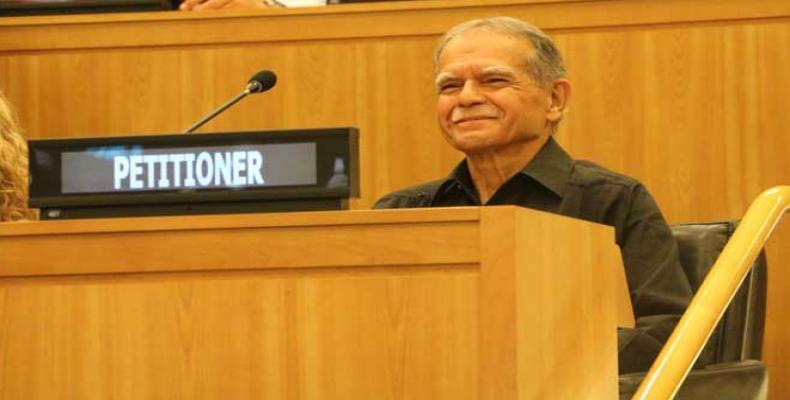United Nations, June 20 (RHC)-- Puerto Rican independence activist Oscar Lopez Rivera has appealed to the United Nations, calling on the Special Committee on Decolonization to analyze the territory's status "to put an end to colonization" at the hands of the United States that Puerto Rico has suffered for more than a century.
During a hearing on Puerto Rico's colonial status on Monday, the iconic freedom fighter, recently released after more than 36 years in U.S. prisons, called on the United Nations to reopen the island's case, arguing that Washington's relationship with San Juan violates norms of international law that "prohibit colonialism."
"Colonialism is a crime against humanity," Lopez Rivera said, adding that U.S. colonialism is to blame for the "criminal" federal fiscal control board imposed on the island last year in the name of tackling the crippling nearly $73 billion debt crisis. Painted as a move to "save" Puerto Rico, the control board has prescribed a number of austerity measures that have affected education and other public services.
The hearing at the U.N. Special Committee on Decolonization comes against the backdrop of Puerto Rico's recent plebiscite on its political status. The body, which formed in 1961 in the struggle against colonialism, is expected to adopt a new resolution that ratifies the right of the island to self-determination and independence.
The resolution, presented by Cuba with the support of Bolivia, Ecuador, Nicaragua, Syria and Venezuela, will demand Washington cede its colonial rule over the island.
López Rivera, who was released from prison last month after more than three decades in jail for his work with Puerto Rico's Armed Forces of National Liberation, called for the issue to be considered "objectively." He argued that the fiscal control board -- known in Puerto Rica as the "junta" -- is poised to "take every last cent from the pockets of Puerto Ricans."
López Rivera was greeted with a standing ovation by other speakers at the hearing, including a number of Puerto Rican liberation activists. While leaders from the independence movement on the island don’t believe the resolution will have much effect, they recognize the importance of international pressure.
"International pressure is always good, but on the other hand I do not think there is a United States momentum to resolve the status," said Luis Dávila Colon, a Puerto Rican analyst. He pointed out, however, a positive effect of the decolonization hearing, which helps "keep the issue alive at the international level." The resolution will be the 35th of its kind passed by the 29-nation Special Committee since 1972, every one of which the United States has ignored.
At Monday’s meeting, the chair of the session, Venezuelan Ambassador Rafael Ramírez, welcomed López Rivera, saying: "The cause of Puerto Rico is and always will be a cause of all of Latin America."
The Secretary of State of Puerto Rico, Luis Rivera Marin, was also among the 60 speakers on the agenda at the hearing. Rivera Marin was set to deliver the results of the June 11 plebiscite on Puerto Rican statehood. Largely considered a failure because of the vote’s 78 percent abstention rate, the population that did cast a ballot — only 22 percent — voted for the island to become a U.S. state.
López Rivera had himself criticized the plebiscite as "a futile exercise” and expressed he was "embarrassed" about the $7 million spent on it, especially at the height of the territory’s debt crisis.
The Puerto Rican Independence Party election commissioner pressed that the plebiscite result "will have no major consequences in (U.S.) Congress." He also emphasized that the “federal junta that controls the fiscal decisions of the government of Puerto Rico has placed the island in the most classic form of colonialism.”
Last week, the Puerto Ricans United in Action group sent a letter to U.S. President Donald Trump and the U.S. ambassador to the U.N., Nikki Haley, urging them to take the official position of the Committee on Decolonization.
Oscar López Rivera Urges UN to End U.S. Colonialism in Puerto Rico


